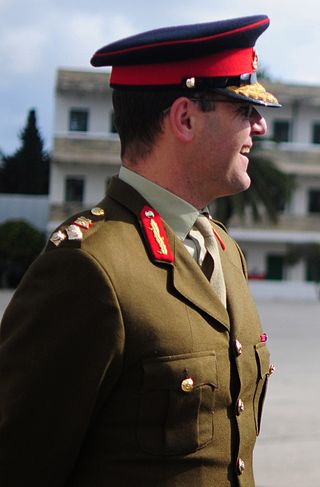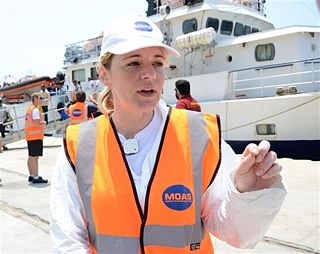
Kazakhstan's approach to foreign relations is multifaceted and strategic, reflecting the country's unique geopolitical position, historical context, and economic ambitions. At the heart of its international diplomacy is a multivector foreign policy, which aims to maintain balanced and diverse relations with all major global powers and regional neighbours. Kazakhstan is a member of the United Nations, Collective Security Treaty Organization, Organization for Security and Co-operation in Europe, North Atlantic Cooperation Council, Commonwealth of Independent States, the Shanghai Cooperation Organisation, and NATO's Partnership for Peace program. Kazakhstan established a customs union with Russia and Belarus which eventually became the Eurasian Economic Union. President Nazarbayev has prioritized economic diplomacy into Kazakhstan's foreign policy.

The International Organization for Migration (IOM) is a United Nations related organization working in the field of migration. The organization implements operational assistance programmes for migrants, including internally displaced persons, refugees, and migrant workers.

The Australian continent was first settled when ancestors of Indigenous Australians arrived via the islands of Maritime Southeast Asia and New Guinea over 50,000 years ago.
Immigration detention is the policy of holding individuals suspected of visa violations, illegal entry or unauthorized arrival, as well as those subject to deportation and removal until a decision is made by immigration authorities to grant a visa and release them into the community, or to repatriate them to their country of departure. Mandatory detention refers to the practice of compulsorily detaining or imprisoning people who are considered to be illegal immigrants or unauthorized arrivals into a country. Some countries have set a maximum period of detention, while others permit indefinite detention.

In international relations, aid is – from the perspective of governments – a voluntary transfer of resources from one country to another. The type of aid given may be classified according to various factors, including its intended purpose, the terms or conditions under which it is given, its source, and its level of urgency. For example, aid may be classified based on urgency into emergency aid and development aid.

Emergency is a humanitarian NGO that provides free medical treatment to the victims of war, poverty, and landmines. It was founded in 1994. Gino Strada, one of the organization's co-founders, served as EMERGENCY's Executive Director. It operates on the premise that access to high-quality healthcare is a fundamental human right.

In 2021, Istat estimated that 5,171,894 foreign citizens lived in Italy, representing about 8.7% of the total population. These figures include naturalized foreign-born residents as well as illegal immigrants, the so-called clandestini, whose numbers, difficult to determine, are thought to be at least 670,000.

Brigadier Martin G. Xuereb was the Commander of the Armed Forces of Malta, a position he assumed on 18 January 2010, succeeding Brigadier Carmel Vassallo.

The Air Wing of the Armed Forces of Malta is the aerial component of the current Maltese military. The Air Wing has responsibility for the security of Maltese airspace, conducts maritime patrol and Search and Rescue duties, medical evacuation, VIP transport and provides military assistance to other government departments of Malta.
Refugees of the Syrian revelation are citizens and permanent residents of Syria who fled the country in the course of the Syrian civil war. The pre-war population of the Syrian Arab Republic was estimated at 22 million (2017), including permanent residents. Of that number, the United Nations (UN) identified 13.5 million (2016) as displaced persons in need of humanitarian assistance. Since the start of the Syrian civil war in 2011 more than six million (2016) were internally displaced, and around five million (2016) crossed into other countries, seeking asylum or placement in Syrian refugee camps. It is believed to be one of the world's largest refugee crises.

By the end of February 2011, medical supplies, fuel and food were dangerously low in Libya. On 25 February, the International Committee of the Red Cross launched an emergency appeal for US$6,400,000 to meet the emergency needs of people affected by the violent unrest in Libya. On 2 March, the ICRC's director general reminded everyone taking part in the violence that health workers must be allowed to do their jobs safely.
The Migrant Offshore Aid Station (MOAS) is an international humanitarian non-governmental organization based in Malta that provides aid and assistance to vulnerable communities worldwide. MOAS main focus is responding quickly and efficiently to emerging crises and make a difference in people's lives.
The Phoenix is a ship built by Davie Shipbuilding in Lévis, Quebec and launched as the trawler GC Bassin in 1973. Since then, her roles have included a research vessel and a training ship, before her current use by the Migrant Offshore Aid Station as a rescue vessel, rescuing people in distress at the Mediterranean Sea.
The Today Public Policy Institute (TPPI) was a Maltese Think tank. It was not affiliated to any political party or movement. It received sponsorship and financial support from a variety of sources including Atlas Insurance, the Bank of Valletta, Mediatoday Ltd, and the Malta Council for Economic and Social Development.

Regina Egle Liotta Catrambone is an Italian philanthropist and together with her husband Christopher Paul Catrambone, the co-founder of the Migrant Offshore Aid Station (MOAS), a non-governmental organisation specialising in search and rescue at sea. Since MOAS's inception over 40,000 people have been rescued during MOAS’ SAR missions running between 2014 and 2017 in the Central Mediterranean and the Aegean Sea. In 2015 Regina was awarded the “Ordine al Merito della Repubblica Italiana” by the President of the Italian Republic Sergio Mattarella and the “National Order of Merit” by the President of the Republic of Malta; Maria Louise Coleiro Preca for services rendered by MOAS – in the location, rescue and assistance of migrants in difficulty within the Mediterranean Sea.

Proactiva Open Arms (POA) is a Spanish NGO devoted to search and rescue (SAR) at sea. Set up in October 2015, it carried out its first rescue action that same month from its base on the Greek island of Lesbos. As well as maintaining a permanent base on Lesbos, the NGO carries out its rescue operations from three ships, a sailing yacht Astral, the Golfo Azzurro and Open Arms.
Immigration to Malta has increased significantly over the past decade. In 2011, immigration contributed to 4.9% of the total population of the Maltese islands in 2011, i.e. 20,289 persons of non-Maltese citizenship, of whom 643 were born in Malta. In 2011, most of migrants in Malta were EU citizens, predominantly from the United Kingdom.
SOS Méditerranée is a European, maritime-humanitarian organisation for the rescue of life at sea, currently operating in the Mediterranean sea in international waters north of Libya. The organization chartered the Aquarius and more recently the Ocean Viking in order to rescue people fleeing by sea from Libya and who risk drowning. The group was founded in June 2015 by German former captain Klaus Vogel and Frenchwoman Sophie Beau after the Italian navy ended the rescue Operation Mare Nostrum in 2014. Its headquarters are in Marseille (France), Milan (Italy), Frankfurt (Germany), Geneva (Switzerland).

The CALP Network is an organisation originating in 2005 and officially launched in 2009 as The Cash Learning Partnership, with the objectives of increasing the scale and quality of Cash and Voucher Assistance (CVA) employed by humanitarian agencies around the world to deliver aid. CVA encompasses aid delivered as cash, or vouchers exchangeable for goods and services, directly to recipients, and represents an increasingly significant aid modality amounting to 21% of total international humanitarian assistance expenditure in 2022. CALP works to build CVA capacity within aid organisations, especially by providing training and e-learning; coordinates the use of CVA by agencies; compiles and shares knowledge and research; and contributes to the development of policy environments encompassing CVA.












